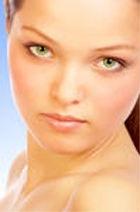
What is skin? In zootomy and dermatology, skin is an organ of the integumentary system composed of a layer of tissues that protect underlying muscles and organs. As the interface with the surroundings, it plays the most important role in protecting against pathogens. Its other main functions are insulation and temperature regulation, sensation and vitamin D and B synthesis. Skin is composed of the epidermis and the dermis. Below these layers lies the hypodermis(subcutaneous adipose layer), which is not usually classified as a layer of skin. The outermost epidermis is consists of stratified squamous epithelium with an underlying basement membrane. It contains no blood vessels, and is nourished by diffusion from the dermis. The main type of cells which make up the epidermis are keratinocytes, with melanocytes and Langerhans cells also present. The epidermis can be further subdivided into the following strata (beginning with the outermost layer): corneum, lucidum, granulosum, spinosum, basale. Cells are formed through mitosis at the innermost layers. They move up the strata changing shape and composition as they differentiate, inducing expression of new types of keratin genes. They eventually reach the corneum and become sloughed off (desquamation). This process is called keratinization and takes place within about 30 days. This layer of skin is responsible for keeping water in the body and keeping other harmful chemicals and pathogens out. Blood capillaries are found beneath the epidermis, and are linked to an arteriole and a venule. Arterial shunt vessels may bypass the network in ears, the nose and fingertips. The dermis lies below the epidermis and contains a number of structures including blood vessels, nerves, hair follicles, smooth muscle, glands and lymphatic tissue. It consists of loose connective tissue otherwise called areolar connective tissue - collagen, elastin and reticular fibres are present. Erector muscles, attached between the hair papilla and epidermis, can contract, resulting in the hair fibre pulled upright and consequentially goose bumps. The main cell types of skin are fibroblasts, adipocytes (fat storage) and macrophages. Sebaceous glands are exocrine glands which produce sebum, a mixture of lipids and waxy substances: lubrication, water-proofing, softening and antibactericidal actions are among the many functions of sebum. Sweat glands open up via a duct onto the skin by a pore. The skin must be regularly cleaned. Unless enough care is taken it will become cracked or inflamed. Unclean skin favors the development of pathogenic organisms. Functions of the skin are disturbed when it is dirty and it becomes more easily damaged. The release of antibacterial compounds decreases. Dirty skin is more prone to develop infections. Cosmetics should be used carefully because these may cause allergic reactions. Each season requires suitable clothing in order to facilitate the evaporation of the sweat. Sunlight, water and air play an important role in keeping the skin healthy.
Skin rejuvenation Your skin is your armor, your shield from the elements. Yet when was the last time you really thought about what you need to do to take care of it? Throughout your life, genetic and environmental factors will cause a lot of wear and tear to your skin. But you are never too young or too old to start taking care of your skin. In fact, skin care and protection should be an essential part of your health, fitness, and beauty regime. If you take care of your skin, your skin will take care of you! If your stuck in a skin care rut, or if you are just looking to learn a bit more about the basics of skin care, read on to learn more about this important step in your daily activities. You are never too young or too old to start taking care of your skin. In fact, skin care and protection should be an essential part of your health, fitness, and beauty regime. If you take care of your skin, your skin will take care of you! But with all of the lotions, creams, and potions on the market, it can be difficult to know which product will work for you. Many products claim to remove wrinkles or heal dry skin. Others claim to contain expensive ingredients that they say will improve the effects of the product. The first step to taking care of your skin is preventing damage. Sun, wind, pollutants, and simply aging can degrade the condition of your skin. Common complaints include dry and itchy skin, wrinkles, sagging, color changes, and age spots. There are steps that you can take to keep you skin looking and feeling its best. A skin care routine does not have to be elaborate in order to be effective. But you should develop some kind of skin care routine based on your skin type, daily activities, and nutritional needs so that you can be sure you are taking the very best care of your skin. Following a daily skin care regime will also allow you to more closely evaluate your skin for abnormalities. Wash your skin thoroughly on a daily basis to remove the dirt, debris, pollutants, and perspiration that accumulates on a daily basis. If you have dry or sensitive skin, use only warm water to wash your skin and use a mild natural cleanser every few days. If you have normal or oily skin, be sure to wash with a gentle cleanser on a daily basis. Be sure to brush your teeth before washing your face, as toothpaste residue can irritate sensitive facial skin. Unless your skin is very oily, you will want to use a moisturizer everyday to keep your skin hydrated and healthy. Your skin needs moisturizer all year long as both the indoor winter heat, and summer sun can be equally damaging to your skin. Why is it that practically everyone in the middle class to the upper levels of demographics in any country are worried about getting wrinkles? Maybe it is the fear of getting old or looking old, or the wanting to look socially acceptable, or just plain vanity. We all have our own reasons. But whatever it is, everyone is united in wanting to solve this age old problem. However, in the first place, do we even have any idea about what actually causes these dreaded wrinkles? It's highly probable that we don't. The most important factor in finding a solution to any problem is finding out the root cause of it. Experts say that the amount of wrinkles that a person will develop through the years also depends on the genetic make up of this individual. However, smoking, sun exposure, dry skin, and repetitive facial expressions and mannerisms such as frowning, can all enhance the creation of wrinkles that may or may not be permanently present. One less painful procedure is the particle skin resurfacing procedure. The process is removes the outer layer of skin in a highly controlled manner. Because of its preciseness, it is practically painless. By repeating this procedure a number of times, the younger skin moves to the surface, thus promoting visible changes in the skin's texture, color and appearance. The benefits of this skin resurfacing procedure are that it causes very little pain or discomfort, no recuperative period is needed, there is minimal risk, it can be used for all skin types, and no anesthesia is required. The important thing to remember when seeking out treatment for your wrinkles is to know first how your body can possibly react to the treatment. Get in touch with a skin doctor for things that you are not sure of, but are contemplating on trying out.

Terms and definitions on this pageAcne
- An inflammatory disease of the sebaceous glands and hair follicles of the skin that is marked by the eruption of pimples or pustules, especially on the face.
Bacteria
- Microscopic unicellular prokaryotic organisms characterized by the lack of a membrane-bound nucleus and membrane-bound organelles.
Dermis
- The sensitive connective tissue layer of the skin located below the epidermis, containing nerve endings, sweat and sebaceous glands, and blood and lymph vessels.
Epidermis
- The outer, protective, nonvascular layer of the skin of vertebrates, covering the dermis.
Hypodermis
- A subcutaneous layer of loose connective tissue containing a varying number of fat cells.
Pimples
- A small swelling of the skin, usually caused by acne; a papule or pustule.
Ultraviolet radiation
- Invisible electromagnetic radiation between visible violet light and X rays.
|